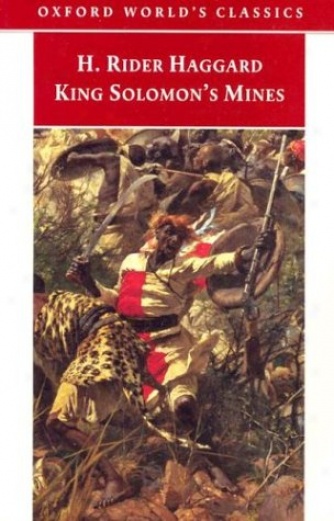 This book, written in 1885, is dedicated by the fictional narrator, Allan Quartermain, "to all the big and little boys who read it".
This book, written in 1885, is dedicated by the fictional narrator, Allan Quartermain, "to all the big and little boys who read it".
H. Rider Haggard's classic is exactly that - a book for men, boys who hope to become men one day, and perhaps for women who long for the days when men were still men.
This book has it all: adventure, romance, exotic locales, big game hunts, treachery, epic battles, crazy old witches, one eyed savages, ancient diamond mines, bloody beheadings, graphic dismemberments, and side-aching hilarity. Often times I found myself thinking of Indiana Jones, Michael Crichton, John Huston movies and the like (but not The League of Extraordinary Gentlemen - an abomination of a movie and a total misfire of the character of Quartermain!). Yet I had to remember that these stories and films were derivative of this, the quintessential adventure story, not the other way around.
Of course having been written over a century ago there are many elements of the book that are outdated. These outdated elements are both positive and negative. The negatives include the underlying racism as well as the unrestricted exploitation of the animal resources of Africa, both common in Haggard's day.
The positive outdated elements I think are what make this book such a great adventure story. Absent is the bleak cynicism of current literature; characters that could be described as "metro-sexual" or effeminate are no where to be found; and gone is any sense of moral ambiguity. Instead the values of honor, romance, nobility, courage, hope, brotherhood, chivalry and faithfulness are on full display. This is a land where men kill what they need to eat, where they will die to defend their honor, and where they will fight evil mano-a-mano. I conjecture that it is no coincidence that the generation that was raised on the romanticism of the late 1800s was the same generation that was able to lead a nation through two world wars and a global depression. Of course there were and are flaws in this kind of romantic outlook on the world, but I believe that there is a vital connection between holding to these values and everyday living that has been lost in our present age and that we would be better off if we rediscovered - and for those who know Christ, redeemed.
"There is no journey upon this earth that a man may not make if he sets his heart to it." p. 49
"Suddenly, with a bound and a roar, they sprang forward with uplifted spears, and the two regiments met in deadly strife. Next second, the roll of the meeting shields came to our ears like the sound of thunder, and the whole plain seemed to be alive with flashes of light reflected from the stabbing spears. To and fro swung the heaving mass of struggling, stabbing humanity." p. 146
"'a sharp spear,' runs the Kukuana saying, 'needs no polish;' and on the same principle I venture to hope that a true story, however strange it may be, does not require to be decked out in fine words." p.8




 This book, written in 1885, is dedicated by the fictional narrator, Allan Quartermain, "to all the big and little boys who read it".
This book, written in 1885, is dedicated by the fictional narrator, Allan Quartermain, "to all the big and little boys who read it".